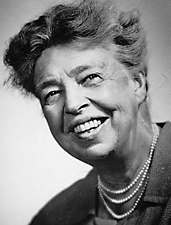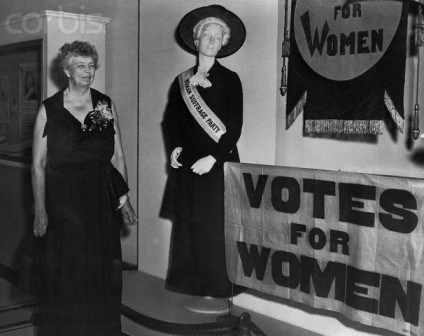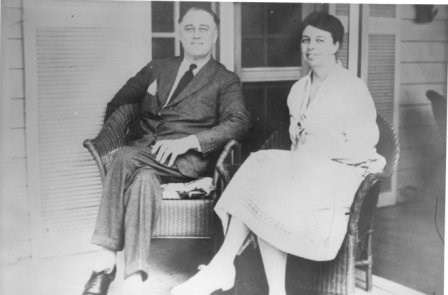 |
| Eleanor Roosevelt (http://www.worldbookonline.com/advanced/extmedia?id=ar474780&st=eleanor+roosevelt&em=pc200461) |
Eleanor Roosevelt once said, “Do what you feel in your heart to be right – for you'll be criticized anyway. You'll be damned if you do, and damned if you don't.” Eleanor Roosevelt followed her own word when she said this; she did what she felt was right in her heart even though some people still criticized her. Eleanor Roosevelt, being the First Lady married to President Franklin Roosevelt, had opportunities to become active in service to society during his political career. Upon her many accomplishments including volunteering with the Red Cross, engaging with the Women’s Suffrage Movement, and working with the United Nations, she was just an average person who have a few difficult times such as the time Franklin Roosevelt was diagnosed with paralysis which was caused by his polio. This resulted with permanent loss of ability to use his legs, but it was the start of Eleanor Roosevelt’s career in the political society when she took the place of her husband’s absence. Her responsibility and leadership contributed to her activism which inspired others with her actions make her a heroine.
 |
| Eleanor Roosevelt visiting an exhibit supporting (http://www.corbisimages.com/Enlargement/U1207313INP.html) |
Mrs. Roosevelt had a leadership opportunity during a difficult time, but it inspired many women to become involved with activism and volunteering. Taking up responsibility was one sign of leadership, but being “one of the most active first ladies in history” is also a great honor. She became part of many associations including the Red Cross: “Eleanor began to do volunteer work again and was thankful that the formal teas and parties had stopped for the moment. She joined the Red Cross canteen, helped organize the Navy Red Cross, and, for the Navy League, distributed raw wool to be knit into clothing for the men in the services. The joy she had felt at a much younger age in helping others returned. She also learned she could quite capably manage groups of people working for a common cause” (Great Depression and the New Deal Reference Library). She didn’t have to join these associations, but she joined because she cared for the cause and wanted to help in the action for them. Some people who want to do something for their community do it for self pride, but she did it selflessly. When she was one of the women who took part in Women’s Suffrage Movement, she did it for the other women who couldn’t stand up for their rights even if they wanted to. With her being part of the public scene, she used that chance to spread the awareness of the lesser rights of women compared to men: “She went so far as to oppose women's suffrage, thinking it violated women's traditional role; now she was coordinating the League legislative program and drafting laws providing equal representation for men and women” (American Decades). She knew it wouldn’t be an easy task to gain rights for women since they’ve always been what you can think of as a second priority. Fighting for women’s rights helped with the Women’s Rights Movement as well, since they were gaining more rights that women should have already had. Eleanor Roosevelt was a great leader in the eyes of many women because she accomplished many things other women didn’t have the “guts” or opportunity to do.
 |
| Eleanor Roosevelt with her husband, Franklin Roos (http://www.presidentialtimeline.org/html/record.php?id=870) |
Eleanor Roosevelt made responsible decisions without people influencing her on choosing what to do in a situation. She took on highly important responsibilities when she took the place of her husband when he became incapable of being present for his duties. In 1921, Franklin Roosevelt was diagnosed with polio which caused his condition of paralysis that disabled him from using his legs: “For the next seven years, Eleanor and his friend and adviser Louis Howe (1871–1936) kept him informed on issues until he could return to politics. Eleanor often said she was Franklin's "legs and eyes" during his years of healing” (Great Depression and the New Deal Reference Library). She took responsibility for his incapability even though it meant coming into the limelight. As a wife, she was supportive of her husband and didn’t believe that quitting for this condition he couldn’t control was no excuse. Her mother-in-law also believed that Franklin Roosevelt should have retired, but that didn’t stop Eleanor either: “Although Franklin's mother insisted that Franklin accept his condition and retire, Eleanor finally asserted her will over her mother-in-law and nursed him back into activity. Within a few years he had regained his strength and political ambitions” (UXL Encyclopedia of World Biography). She didn’t let anyone get in the way of what she knew what was best, even when the advice came from family, because she didn’t give up right away without trying and succeeded nursing both her husband back to heath and discovering a “turning point” in becoming part of the political world. As a result, her responsible decision making lead her to the path of being the humanitarian activist she was.
Eleanor Roosevelt’s duties to leadership and responsibility contributed to her activism in humanitarianism which inspired others make her a heroine. Becoming part of various organizations to help others, especially women during the Women Rights Movement, she showed great leadership roles. Eleanor Roosevelt is an inspiration to many people, specifically women, because without her help, women wouldn’t have gained the rights that they hold today. When her husband became disabled, she took up his responsibilities during the time he wasn’t able to perform them himself, without anyone telling her to. In the quote, “Do what you feel in your heart to be right – for you'll be criticized anyway. You'll be damned if you do, and damned if you don't,” Eleanor did what she felt in her own heart to be right and look how far she came. Now, she’s considered a hero for everything she’s done. A hero is someone who does selfless acts, and Eleanor Roosevelt has portrayed them like a true hero should. Although she is what you call, the “Average Joe,” she has accomplished so many extraordinary achievements.
"Eleanor Roosevelt." American Decades. Ed. Judith S. Baughman, et al. Detroit: Gale, 1998. Gale Student Resources In Context. Web. 11 Jan. 2011.
Maney, Patrick J. "Roosevelt, Eleanor." World Book Advanced. World Book, 2011. Web. 12 Jan. 2011.
"Roosevelt, Eleanor." Great Depression and the New Deal Reference Library. Ed. Allison McNeill, Richard C. Hanes, and Sharon M. Hanes. Vol. 2: Biographies. Detroit: UXL, 2003. 185-196. Gale Virtual Reference Library. Web. 14 Dec. 2010.
"Roosevelt, Eleanor." UXL Encyclopedia of World Biography. Ed. Laura B. Tyle. Vol. 9. Detroit: UXL, 2003. 1621-1624. Gale Virtual Reference Library. Web. 14 Dec. 2010.
Women in History. Eleanor Roosevelt biography - extended. Last Updated: 1/11/2011. Lakewood Public Library. Date accessed 1/11/2011 . http://www.lkwdpl.org/wihohio/roos-elex.htm.
Page created on 1/20/2011 12:00:00 AM
Last edited 1/20/2011 12:00:00 AM
